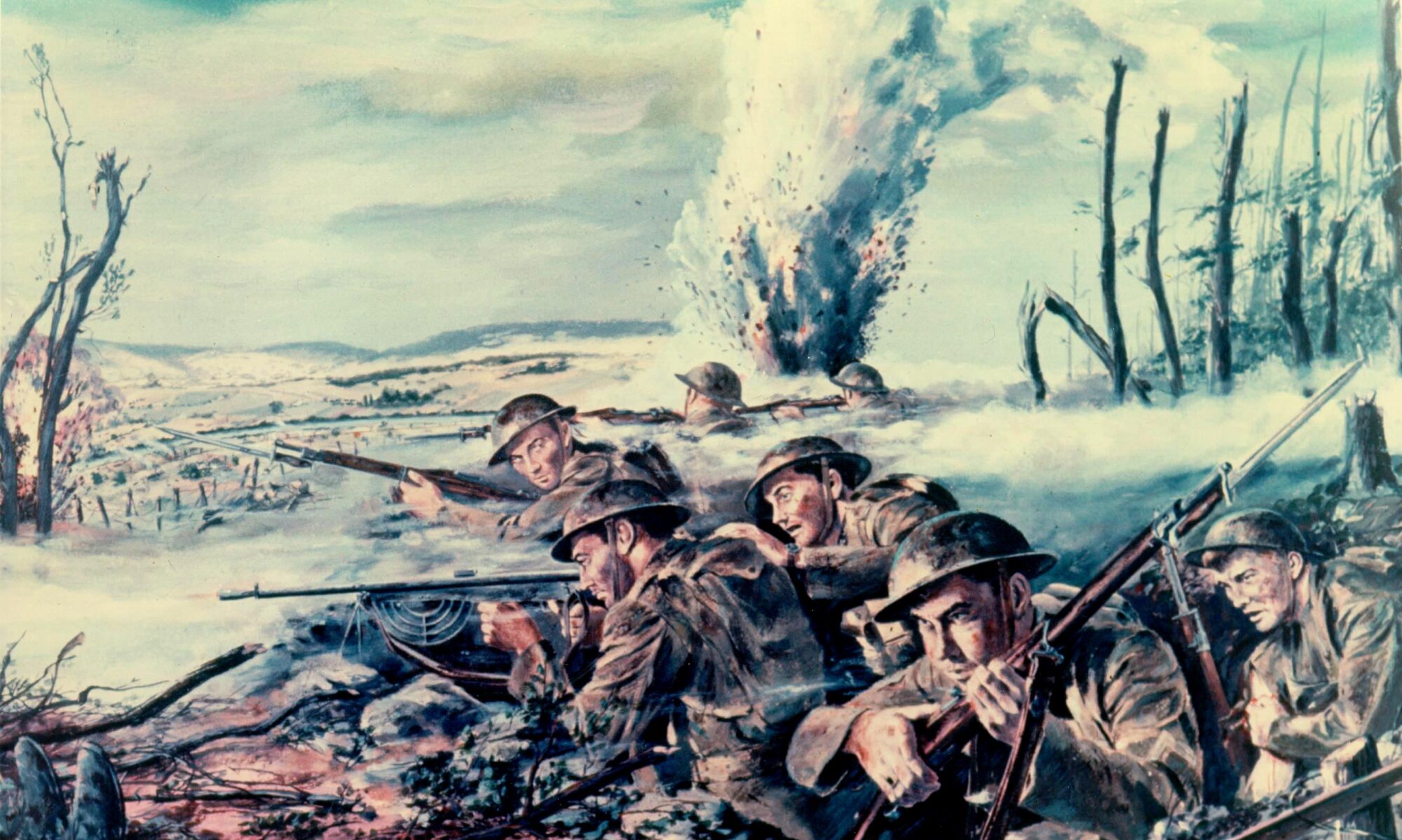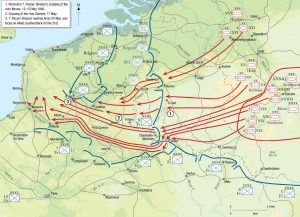The fall of France in 1940 is often seen as inevitable. But at the time it shocked most people, even the French and Germans themselves. Most experts thought the French Army was the best in Europe. Churchill, Stalin and most leaders had confidence in it, and many of Hitler’s generals thought invading France was suicide. In 1940 Britain and France were the dominant global powers; having the largest empires, most resources, and most diplomatic influence. The Battle of France destroyed this balance, and started events and trends that drastically changed the world.
France’s defeat turned a local European war over Poland into a global struggle, which eventually sucked in all major powers, and most countries of the world. Who would have predicted a war begun by the invasion of Poland would end with nukes dropped on Hiroshima and Nagasaki? The era of French and British domination of global affairs collapsed in 6 week once France surrendered to Germany.
How the Fall of France Effected the Major Powers:
Nazi Germany went from being an encircled, resource starved nation into the dominant power in Europe within a few years. After Germany overran most of Russia’s heartland in 1941 it had more industry, population, and resources (except oil) than Russia and Britain combined. Only American industrial might allowed the allies to outproduce and overwhelm the German war machine later in the war.
With France out of the way, and Britain fighting to survive, Germany turned on the Soviet Union and nearly destroyed it. But the Soviet Union survived due to its efficient war economy, allied Lend-Lease, and bad German strategy. By 1945 it had gone from a pariah nation to a superpower. Before the war the Soviet Union had little influence beyond its borders, afterwards it competed against America for global dominance in the Cold War.
Italy entered the war as France collapsed, expecting cheap gains, and becoming the dominant power in the Mediterranean, as Britain was expected to surrender as well. While Italy’s forces generally didn’t perform well its entry into the conflict opened new theatres of war. This stretched Britain’s resources thin, and it suffered many defeats when Germany intervened to prevent Italy from humiliating defeats. Italian intervention also limited what forces Britain could send to their colonies in the Far East. While this would doom British imperialism in Asia, it also led to Italy’s defeat, Mussolini’s death, and the fall of Italian Fascism.
Japan also took advantage of France’s defeat to expand in Asia and the Pacific. With France defenceless, Britain fighting to survive, and America clinging to neutrality, Japan had a freehand in the Far East. At first Japan took control of north French Indochina, then conquered the rest in 1941. Japan’s brutal war in China, and it’s aggressive means to pressure the allies to stop supporting the Chinese, also expanded the war.
These actions led to America’s oil embargo on Japan in 1941 that precipitated Pearl Harbor and American entry into World War 2. Japan quickly overran western colonies in Asia, and humiliated Western forces, which forever discredited racist justifications for Empire. Within a generation all colonial empires had died, and countless new nations, and tragic conflicts, emerged in their place. But Japanese imperialism died first thanks to American industry, naval and air power, and nuclear weapons.
The Battle of France also changed America. Despite wanting neutrality America became increasingly tied to supporting Britain against Nazi Germany. Eventually this led Hitler to declare war against America 4 days after Pearl Harbor. Japanese aggression in the Far East after France fell, and how it dragged America into war, has already been noted.
But America’s entry into the war gave the allies an overwhelming advantage. Within 3 years America became the strongest military power in the world, having the largest airforce and navy, and nuclear weapons. It also replaced Britain and France as the most influential force in global affairs. Finally, America was the dominant industrial power of the war, having produced 50% of all weapons, including 66% of all allied arms.
Decolonization and the Spread of Communism:
Due to France’s collapse, and its effects on the major powers, there were major geopolitical shifts after the war. Decolonization and the spread of communism were accelerated as France and Britain quickly declined. It’s hard to see the French and British Empires, and other western ones, falling so swiftly had France held out in 1940. France’s defeat and the costs of Wold War 2 left these empires bankrupt, weak, and their peoples increasingly reluctant to fight to keep their colonial possessions.
As for the spread of communism Germany was free to attack the Soviet Union once France fell. The Soviet Union lost countless people and suffered terribly, but it emerged as a superpower after the war. Before the conflict it was a pariah state, its influence limited mostly within its borders. However, the Soviets victory over Nazi Germany, and intervention against Japan in 1945, decisively expanded communist influence across the world. The Soviet advance into Eastern Europe also created communist states, and guaranteed the Cold War between America and Russia for the next 45 years.
The Soviet Union’s advances into Manchuria and Korea helped Mao Zedong win the Chinese Civil War, and created a communist regime in North Korea. The communist victory in China allowed Mao to support Ho Chi Minh, which let him kick France out of Vietnam. The split of Vietnam into 2 states, and the communist north’s determination to overrun the South, also dragged in America and led to the Vietnam War. Communist insurgencies sprung up in former colonial possessions like Malaya, the Philippines, Angola, Greece, Laos, Cambodia, Bolivia, etc. Even developed powers in Europe like France and Italy came close to going communist like during the Italian election of 1948.
It’s hard to see such historical events and trends happening, as least as quickly, had France not fell in 1940. Britain and France would have remained the world’s foremost powers for probably another generation. Germany wouldn’t have overran most of Europe and likely lost a war of attrition against France and Britain. The Soviet Union would have stayed a pariah state and not expanded its influence as widespread. Italy wouldn’t have attacked Britain and France and Mussolini’s laughable regime might have lasted as long as Franco’s in Spain.
Japan wouldn’t have attacked western colonies, being bogged down in China and not having a vacuum of power to exploit. With Germany contained, and Japan not expanding into South East Asia, America wouldn’t have been dragged into war and may have continued its policy of isolationism for many years. Decolonization would have been delayed, maybe for decades, and the spread of communism limited, perhaps permanently.
What Ifs and some Final Thoughts:
The Battle of France was the catalyst for these events and historical trends. There are few battles in history that produced so many global changes in such short time.
But it would be unfair to say the Battle of France was the most influential battle of the 20th Century without considering others. There were many battles in World War 1, World War 2, the Arab-Israeli Wars, and others that determined their outcomes, and changed the world.
The First Battle of the Marne, the Hundred Days Offensive, and the First Battle of the Atlantic contend for the most decisive battle of World War 1. The Battles of Britain, Moscow, Stalingrad, Kursk, Midway and Second Battle of the Atlantic do the same for World War 2. There are too many battles regarding the Arab-Israeli wars yet Israel’s wars against Egypt and Syria, especially 1967 and 1973, arguably shaped the Middle East decisively. However, none of these instances upset world geopolitics so thoroughly, or changed the dynamics of their conflicts as much as the Battle of France.
There’s also the question if France was doomed to fall. It’s easy to contrast the skill, efficiency and boldness of the Germans during the battle versus the incompetence, lethargy and general timidity of the French. It’s undeniable Germany had the advantage in communications, combined arms, doctrine, and leadership. But on paper at least the allies had most strategic and material advantages.
Regarding manpower, economics, industry, resources, geography, artillery, tanks, and ships Britain and France were stronger. Only in air power the Germans had a clear advantage but this could have been neutralized if Britain committed more planes, or France deployed more aircraft doing nothing in Southern France and North Africa. In most simulations of the battle France and Britain beat Germany.
If Germany stuck to the original invasion plan, a predictable repeat of the Schlieffen Plan of WW1 that France expected, the Germans would likely have lost against France’s larger tank and artillery forces. Had France held back a strong reserve it could have cut off, even destroyed, the German risky armored rush to the English Channel. This advance was vulnerable to attack, and worried the German high command and Hitler constantly. France could have covered the Ardennes forests with enough forces to delay the main German attacking force until French reinforcements arrived to stop a breakthrough.
The accidental death of General Billotte when the battle was in the balance, German bluffs during the Meuse crossings, and Rommel’s forces ambushing French tanks while refuelling, relied on luck and French mistakes. This doesn’t mean Germany wasn’t favoured to win the battle, but it suggests France wasn’t doomed to lose it.
Had the French won the Battle of France, or survived it, there’s little doubt the world would look drastically different today. For good or bad no other battle influenced the 20th Century as it did.
Bibliography:
Bauer, Eddy. Illustrated World War 2 Encyclopedia: Volume 1. New York: H.S. Stuttman INC. Publishers, 1978.
Beevor, Antony. The Second World War. New York: Little, Brown and Company, 2012.
Churchill, Winston. The Second World War: Volumes 1-2. Boston: Houghton Mifflin Company, 1948-1953.
Deighton, Len. Blood, Tears and Folly: An Objective Look at World War 2. New York: Castle Books, 1999.
Macksey, Kenneth. Military Errors of World War 2. London: Cassell, 1999.
Magenheimer, Heinz. Hitler’s War: Germany’s Key Strategic Decisions 1940-1945. London: Cassell, 2000.
May, Ernest. Strange Victory: Hitler’s Conquest of France. New York: Hill and Wang, 2000.
Nord, Philip. France 1940: Defending the Republic. New Haven: Yale University Press, 2015.
Powaski, Ronald E. Lightning War: Blitzkrieg in the West, 1940. Hoboken: John Wiley & Sons, 2003.
Warner, Philip. World War 2: The Untold Story. London: Cassell, 2002.
Wragg, David. Snatching Defeat from the Jaws of Victory: 20th Century Military Blunders. Gloucestershire: Sutton Publishing, 2000.


